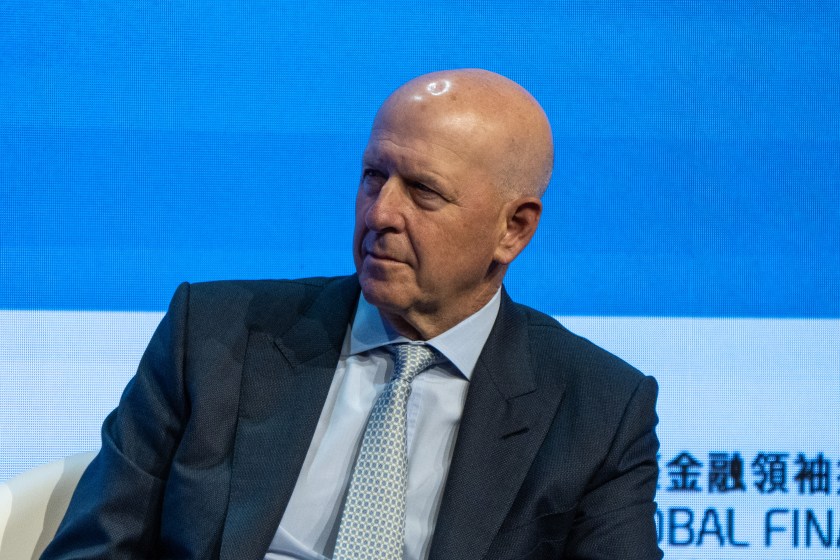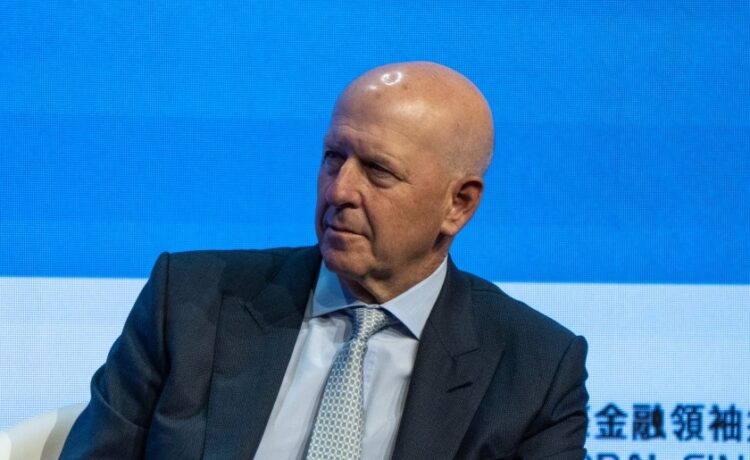
Under CEO David Solomon, Goldman Sachs launched new diversity initiatives. One of them, Launch With GS, the bank has sunset after saying it met its goal to invest $1 billion in diverse founders. Vernon Yuen/NurPhoto via Getty Images
Starting in 2018, Goldman Sachs announced a strategy called Launch with GS that eventually committed to investing $1 billion of firm and client capital into companies led, founded, and owned by women and people of color. Now, one of the world’s largest investment banks has shuttered the initiative, claiming it has fulfilled its goal and is now focusing its diversity efforts elsewhere.
The $1 billion pledge was a major statement for a bank that had taken a stand among its Wall Street peers on issues of diversity. In the same time period, the bank also announced it wouldn’t help companies go public without at least one diverse director on their boards. In both cases, Goldman cited a financial case for the decisions. Companies with at least one diverse board member performed better after listing, CEO David Solomon said. The goal of Launch With GS was to “generate strong investment returns,” then-chief strategy officer Stephanie Cohen wrote in a 2018 blog post announcing the program.
Goldman says it crossed a big milestone in June 2023: meeting its commitment to investing $1 billion in diverse-led companies. Yet, there was no flashy announcement trumpeting the achievement. Goldman’s Launch With GS website was quietly updated in recent weeks to describe the initiative in the past tense and say that the bank deployed $1 billion to meet its goal. Much of that was within its asset and wealth management division. Launch With GS was responsible for “nearly 60 investments” over the past five years and ran five “entrepreneur cohorts” supporting 47 startups, Goldman tells Fortune. Recipients of Launch With GS-supported investments include the companies BentoBox, Billie, Burst Oral Care, and LeaseQuery as well as the funds Construct Capital, Define Ventures, and MaC Venture Capital.
Regina Green, a nearly 17-year Goldman veteran who became the head of Launch With GS in May 2021, announced on LinkedIn in the first week of 2024 that she was departing the firm. A handful of Goldman staffers who worked on Launch With GS were reassigned to other jobs. Cohen, the senior executive who championed Launch With GS at its beginning, has been on personal leave from Goldman since June 2023.
“I’m so proud of the work we’ve done, the founders and managers we’ve partnered with, and the impact we’ve had so far,” Green wrote on LinkedIn in announcing her departure. She said that she eventually planned to continue to “partner with and invest in emerging managers funding innovative solutions for our most challenging problems.”
The bank is pivoting its focus to its One Million Black Women Initiative, a 10-year pledge made in 2021 to provide $10 billion in investment capital (including more categories than venture-focused Launch With GS) and $100 million in philanthropic aid to address the “dual disproportionate gender and racial biases that Black women have faced for generations.” Goldman says it has deployed $2.3 billion toward that investment goal so far and has four team members dedicated to the program.
After Fortune contacted Goldman about the end of Launch With GS, the bank put forward Asahi Pompey, its global head of corporate engagement and foundation president, for an interview. She says that the strategies of Launch With GS are now integrated throughout the firm, especially its asset and wealth management division. “We have integrated the sourcing and ecosystem into our existing [asset and wealth management] business,” she says. “Our investors are always thinking opportunistically about finding fantastic investments … and we know that diverse companies outperform…Launch was a way to widen our aperture.”
She says that rather than celebrating hitting a goal with Launch With GS, the firm’s “focus is very much on the $8 billion that lies ahead of us” through its One Million Black Women program.
The end of Launch With GS’s journey from flashy launch to quiet sunsetting comes amid a period of tumult for the bank and for corporate diversity, equity, and inclusion programs more broadly. About 200 partners have left Goldman Sachs since Solomon took over, according to New York Magazine. The CEO has been criticized for extending Goldman too far beyond its core business.
Following the Supreme Court’s overturning of affirmative action, opponents of race-based funding and decision-making have started suing businesses that have publicly committed to such initiatives. Lawsuits have hit the venture capital firm Fearless Fund, the startup Hello Alice, and law firms.
Across the industry, a challenging market has made it harder for founders and emerging managers—especially women and people of color—to raise funds. Funds raised by emerging managers declined by almost 35% between 2021 and 2022. In 2023, emerging managers secured less than $20 billion in commitments for the first time since 2016.





